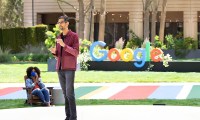Google just showed off some impressive advances that it’s bringing to Google Assistant in the near future. By shrinking down speech-recognition and language-understanding models, it has found a way to squeeze 100GB of models from the cloud down to less than half a gigabyte that can run locally on your phone.
The demo at Google I/O showed off the Google Assistant running on a phone and performing tasks with almost no latency. You can ask Google Assistant to launch apps, reply to texts, find photos, compose emails, and more without any delay and without the need for a network connection.
The next-generation Google Assistant can process your questions and requests and deliver answers up to 10 times faster. With the new Continued Conversation feature, you can make several requests in a row without having to say “Hey, Google.” The demo featured someone dictating a reply to a text message, asking to see photos, specifying photos with animals in them, and then sharing those photos in the text, all through a series of voice commands to Google Assistant.

It demonstrated an understanding of context and the ability to multitask across apps. For example, your friend may text to ask when your flight arrives, and you can consult Google Assistant, see the flight info card, and put that information into your reply, all with conversational voice commands. More complex speech is possible too, allowing you to start composing an email, then switch to set the subject, then go back to the email body, and have Google Assistant correctly determine what you mean.
The next-generation Google Assistant is set to debut on new Pixel phones later this year.
Duplex for the web
Google also showed off advances to Duplex, which is currently available in 34 U.S. states and allows you to ask Google Assistant to book a restaurant reservation for you. It is being extended to the web starting with car rentals and movie tickets.
The demo on stage at I/O focused on a calendar reminder that popped up for an upcoming trip. It’s possible to ask Google Assistant to “Book a car with National for my next trip,” and have it automatically fi out online forms on the car rental website and then asked for confirmation before going ahead with the booking. It can automatically draw payment information saved in Chrome or trip details from Gmail.
Duplex on the web is coming later this year in English for the U.S. and U.K. on Android phones with Assistant.
Getting personal

Google wants the Assistant to be personal. That way, when you say something like “Show me a recipe” or “How’s the traffic at my Mom’s house?” it bases its suggestions on the kinds of things you’ve cooked in the past or the time of day and knowledge of your Mom’s address. This understanding of Personal References will also allow you to say things like “Show me pictures of my daughter.” It will be contained in a new You tab that you can review, edit, and delete, so it’s up to you how personal you get with Google Assistant.
Driving Mode
Google has already rolled the Assistant into Android Auto and Google Maps, but it’s coming to Waze in the next few weeks. That means you can navigate, answer or reject calls, and play music or podcasts completely hands-free. A new simplified Driving Mode features a less distracting interface with relevant shortcuts. These may include a suggestion to continue the podcast you were listening to at home last night and pick up where you left off, top contacts you’re likely to want to call, or suggestions for music you might like. You can ask it to “play rock” and get a station based on your previous preferences.
When a call comes in, Google Assistant will inform you who is calling so you can decide whether to pick up or not with a voice command. Driving Mode will be available this summer on any Android phone with Google Assistant.
There are also new remote controls for cars that support them, enabling you to ask Google Assistant on your phone or Google Home to set the temperature in your car, check the fuel level, or make sure your doors are locked — all without getting out of bed. These remote options are just for cars with Hyundai’s “Blue Link” and Mercedes-Benz’s “Mercedes me connect.”
Just stop
The final demo was a simple one. On any Android device you have set an alarm or timer on, you no longer have to say “Hey, Google, stop.” You can simply say “Stop” and it will cease. Just don’t blame Google Assistant when you sleep in for work.
The Google Assistant is now available on 1 billion devices worldwide, in more than 30 languages, and across 80 countries.


